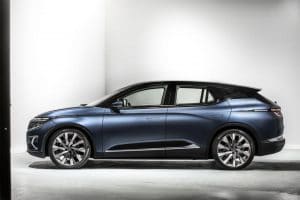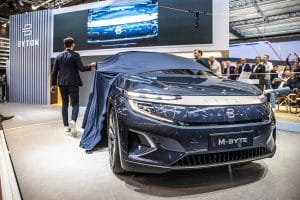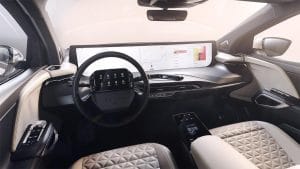There were plenty of skeptics when Chinese start-up Byton pulled the wraps off its M-Byte concept vehicle at the Consumer Electronics Show last January. But eight months later, with what the company has dubbed a production version of the battery-electric vehicle makes its debut at the Frankfurt Motor Show, Byton’s plans are being taken a lot more seriously.
Sure, the model that’s on display at the Frankfurt Messe, the German city’s convention complex, can stretch the idea of what an automobile is supposed to be – especially when one gets a look at the interior, with its 48-inch video display replacing a conventional dashboard. But there are plenty of reasons to start believing Byton can pull off what only a few other start-ups, notably Tesla, have managed.
“Today’s unveiling,” Byton founder and CEO Daniel Kirchert said in Frankfurt, “shows the effort paying off for the team, which has worked relentlessly on the car for over two years. Within that short amount of time, together we have taken a smart electric car from an initial idea on a white sheet of paper to series production readiness, while also building a coherent infrastructure with locations on three continents and an efficient Industry 4.0 production facility in China. We can rightfully be proud of this.”
(Byton M-Byte’s Videoscreen Will Be as Large as 7 iPads; Following Different Model)
Byton has several different products it is working on, but the M-Byte is set to become the first to go into production. It is targeting what might be called the mid-luxury EV market, somewhere between the Tesla Models Y and X, and going up against the likes of the Jaguar I-Pace and newer Audi e-tron.

The M-Byte will start at about $45,000 and its expected to compete in a segment between the Tesla X and Y.
The base version of the M-Byte will start at $45,000, the company said in Frankfurt, for which a buyer will get a 72 kilowatt-hour battery pack capable of yielding 224 miles, according to the European WLTP test cycle, (and likely slightly less than 200 once tested for the U.S. market by the EPA).
Following the Tesla model, Byton also plans to offer an upgraded version with a dual-motor drive, one on each axle to create a through-the-road all-wheel-drive system. It also gets a bump up to 92 kWh and, again using the European test cycle, should yield closer to 270 miles per charge. The base car will produce 270 horsepower, the upgraded version 402. It hasn’t yet released performance numbers.
The distinctive styling of the M-Byte is likely to get it noticed. And that’s especially true inside, where it features a video screen dashboard stretching from door-to-door. The screen will replace conventional gauges and most traditional controls. It will incorporate infotainment features and even allow passengers to watch videos – though regulators are likely to put some limits on what can be seen by the driver.
(Chinese EV Maker Byton Unwraps 2nd Model)
The 48-inch display also will anchor the autonomous capabilities Byton is planning to build into M-Byte, though almost certainly not at launch next year. But its focus on incorporating self-driving capabilities has earned credibility considering it is working with Aurora, the start-up founded by autonomous tech pioneer Chris Urmson.
Byton’s other big coup was inking an alliance with one of China’s biggest homegrown auto companies, First Automobile Works, or FAW. The companies are expected to announce even bigger ties later this year, but the investment by the state-owned company has been crucial as it readies its $1.5 billion factory in Nanjing, not far from its Chinese headquarters.
Byton is no longer a garage start-up, not with about 1,600 employees around the world. But it still has some of the headaches that go along with a company just getting its act together. Among other things, it lost its co-founder, former BMW i chief Carsten Breitfeld, earlier this year. He is now trying to salvage what’s left of another Chinese-funded battery-electric vehicle start-up, Faraday Future.
Barring a meltdown on the order of what Faraday has experienced, Byton plans to launch production by the middle of next year, initially targeting the home Chinese market. But it wants to start shipping cars to both Europe and North America in 2021.
(Byton Looks to Make a Splash at Pebble Beach)



Is that a keyboard on the steering wheel? Fat chance they’ll succeed.